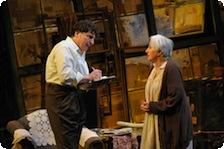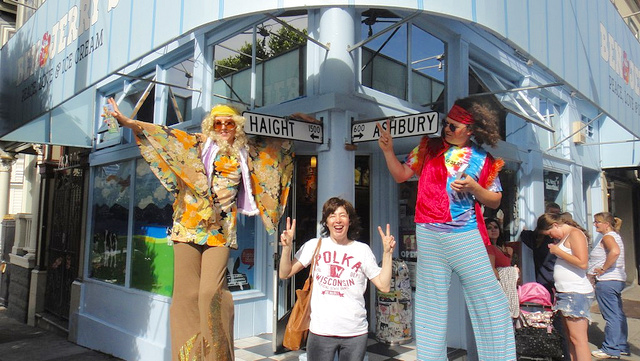by Evan Karp
Morris Panych’s Vigil, being staged now at San Francisco’s American Conservatory Theater, is at once tender and dark and funny, a series of extended punchlines replete with pathos and unwavering conjecture about the nature of human existence. His writing is clever—the jokes operate as a motif and the insight like jokes—the comedy, no matter how consistent or funny, is always interrupted by vision. Vigil is one of those plays that reminds you of the role theater should occupy: to serve as a signpost for community value.
The play, directed here by Panych himself, begins when Kemp (Marco Barricelli) quits his job as a banker to share his dying aunt’s final few moments, even though he hasn’t seen her in 30 years and they never got along in the first place. At least not how Kemp would have had it. Barricelli says of Kemp that he observes
“a vibrant, active life, and he’s full of opinions about it, but he has nowhere to put it. He doesn’t share it with anybody. He claims that he doesn’t like people, yet he has a desperate need for relationship. … He’s alone.”
Barricelli was a member of A.C.T.’s resident core for almost a decade, has served on the artistic team, and played a plethora of leading roles there, including The Narrator in For the Pleasure of Seeing Her Again alongside Olympia Dukakis, who plays the old aunt (Grace) in Vigil. His performance is dynamic, strung together by the kind of humorous self-irony you might expect from a loner with a play-long monologue.
Attendees expecting Dukakis to carry the show will be disappointed; she has 13 lines in the entire play. But her experience is evident and presence commanding despite this, and in large part makes Barricelli’s nearly seamless deliveries possible.
Kemp, who has literally dropped everything and hopped the first train for auntie’s with an empty suitcase, is in for quite the surprise. “I’m concerned about your health these past few days,” he says. “It seems to be improving.” Often lines like these are followed by a blackout, during which the characters change their positions. The stage is a dilapidated attic-turned-bedroom in which rest the relics of Grace’s entire life; she too has retreated into a life void of other humans, even to the point of plastering now-faded newspaper against the dusty window-panes to keep the rest of the world out. She seems ready to be alone, unequivocally, but far from intent on dying.
Kemp arrives in the Fall and his initially relentless remarks about Grace’s immanent death gradually change with the seasons into something softer … despite the persistence of his commentary on the general travails of life there is a whiff of amelioration, and the two strangers seem to be connecting despite Grace’s silence and their respective determinations to be alone.
There are few changes to the set through the course of the play, but Ken MacDonald (scenic and costume) and Alan Brodie (lighting) do a fantastic job designing a perceptible shift in mood and meter. Lights from behind the set pour through the blue windows and into the room, and at times there are what appear to be trees between the back of the set and the lights; shadows are cast on the panes. At one point there are even leaves falling through the roof and onto the bed. Alessandro Juliani (sound) and Meg Roe (composer) enhance these moments with tasteful piano-heavy interludes and aural punctuation. There is alternately the sound of children playing down in the streets and the cool glow of moonlight in a still bedroom attic.
But nothing takes attention off the main focus, the disjunct between these two self-absorbed individuals. As Kemp talks about everything from his one fond childhood day to the moment his father committed suicide, Grace is either eating or knitting or applying makeup. Occasionally she looks at him and even pays attention, but inevitably he loses her interest and she returns to the mirror.
In many ways this is a play about the threatening certitude of dying alone. As the amount of Americans over the age of 65 grows rapidly, while we as a nation not only have a hard time passing health care reform but also contain an unruly percentage of citizens who consider abortion murder but health care criminal, the play has particular relevance now. Grace is lonely and Kemp is lonely and although initially they hate one another they grow to appreciate the company.
But this is not just a tale of old age or even of old and middle ages. Vigil subtly but very clearly exposes the chasm between any two human lives. As Panych says,
“We’re just so selfish now. We’re so concerned about doing our own thing, because we don’t live in family groups anymore. We live in weird urban groups, so family is seen as “a problem.” Vigil addresses that. It’s a satire, essentially …”
At one point Kemp remarks: “I had no faith: I couldn’t believe anyone could care about me.” This relationship between faith and self-worth captures the modern dissolution of social obligation and communal story in stead of ambition and identity-through-career. In one of her few lines, Grace observes that “the only way to find happiness is to create it.” It turns out the same is true of family. Just because two people are related does not necessarily mean they have a connection; it’s not something that can be taken for granted.
The title of this play is alluded to when Kemp discusses his sexual interests … or complete lack thereof. To Kemp, people spend their entire lives trying to find sex so that they can forget all about the real world and its worries, hardships, and painful truths. “But I never forget,” he says. “I am vigilant.” He says it with a hollow pride that reveals his true feelings—even if he can’t admit them. What he needs is connection, no matter what kind or what it means.
Vigil is a strong play—well-written, powerfully performed, timely and far-reaching, both light- and heavy-hearted. Kemp compares the loss of a life to the loss of a limb. Sometimes, as a war vet amputee tells him, you can still feel the tingle of your limb as if it were never lost. The same is true of humans. We get on without them because it would be criminal not to. Even though it’s not the same as before. Even though it hurts. Vigil explores this hard truth without preaching and without gross sentimentality. I not only recommend it—I consider it your duty: to the community and to yourself!
WHERE:
American Conservatory Theater | 415 Geary Street, San Francisco, CA 94108
WHEN:
March 25–April 18, 2010
Tue.–Sat. at 8 p.m. (4/6 performance at 7 p.m.)
Wed., Sat. & Sun. at 2 p.m. (no matinee performances on 3/28, 3/31) Additional performances: 4/11 (7 p.m.)
InterACT Events:
Postperformance Audience Exchanges…………………..4/6 (7 p.m.), 4/11 (2 p.m.), 4/14 (2 p.m.)
OUT with A.C.T………………………………………….4/7 (8 p.m.)
How Much
$10–$82
Premiere | Orchestra | Dress Circle | Balcony | 2nd Balcony
Weekends
$82 | $67 | $57 | $41 | $22
Weekdays
$71 | $57 | $47 | $34 | $17
Previews
$57 | $47 | $37 | $27 | $10
TIX & INFO
415.749.2228 | www.act-sf.org












